Juventud Rebelde 221
Posada Carriles has died

Unpunished, But Unsuccessful
Published: Wednesday 23 May 2018 | 09:46:02 PM
Alone, as befits criminals of his ilk, Luis Posada Carriles has died. He leaves with bloodon his hands and without paying for his crimes, but also without having achieved his purposes.
By Marina Menéndez Quintero
Marina Menéndez Quintero
marina@juventudrebelde.cu
A CubaNews translation.
Edited by Walter Lippmann.
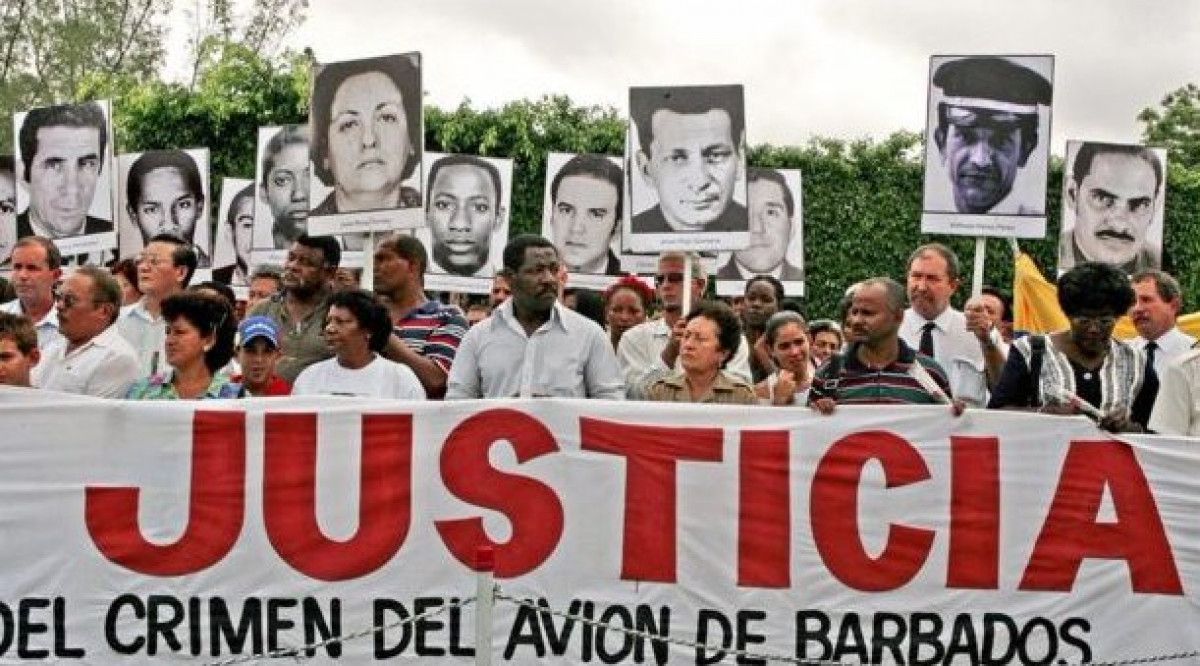
Cuba never ceased its efforts to see justice done Author: Juventud Rebelde Published: 05/23/2018 | 09:20 pm
It is not known whether the CIA, to whom he owes so much for his dirty work, will send him flowers. Nor, if there are any close relatives to mourn him.
An article in the El Nuevo Herald newspaper that reflects the news says that he died at the age of 90 at the Memorial Regional Hospital in Hollywood, in Broward, with his health deteriorating from cancer of the throat and fractures from an accident.
It is known that he had previously been in a veterans’ home (where those who do not have a caregiver are supposed to go), and that he left two children who did not have close relationships with him.
I have heard it said that a close relative living on the island was embarrassed by the blood ties that – they were the only thing – united her with him…
Luis Clemente Posada Carriles does not even deserve a single one of these, or any other line, although it should come as no surprise that the remnant of the retrograde ultra-right and violent claque that survives in Miami – among the dignified Cuban majority who want the best for their homeland – regrets his departure. No one but the human remains of the 2506 Brigade – whose men fuelled the defeated invasion at the Bay of Pigs – could announce that they would make an “honor guard” of him.
Posada did not deserve to leave as he has, without paying for his crimes against Cuba, Venezuela, Nicaragua and El Salvador, among other countries he helped to spread with his death.
Although we Cubans repudiate him for the Barbados crime and the 73 lives he took in that attack – a reason to condemn him – Posada leaves a record that will freeze the blood of anyone who, even as the years go by, wants to know his criminal record.
He tortured in Venezuela as Commissar Basilio de la terrible DISIP; he tried to assassinate Fidel in the Paraninfo of the University of Panama in November 2000, in an action frustrated by the denunciation of the Commander in Chief who had killed a thousand istmeños [people from the isthmus]; bought mercenaries of Central American origin to blow up hotels in Cuba in 1997, with explosions that killed Italian tourist Fabio Di Celmo; he participated in the scandal known as Contragate in the 1980s, during the dirty war against Sandinista Nicaragua.
He was trained by the Central Intelligence Agency at Fort Benning, and in 1967 the agency sent him as an advisor to the secret services of the dictatorships of Argentina, Chile, El Salvador and Guatemala.
The atrocities he committed were many, but perhaps what best revealed his lineage was the lack of modesty in the statement he gave to a New York Times journalist in the wake of the Havana attacks.
Then he said that, despite this, he slept “like a baby”.
None of this, not even the evidence that proved his links to the attacks on Havana hotels and was presented in the face of the judicial farce in El Paso, Texas, in 2011, was taken into account by the jury, before which he was barely taken as an illegal immigrant, after the shameful pardon granted to him by former Panamanian President Mireya Moscoso, and his illegal entry into the United States. It was the only time he ever sat in the dock.
There, where the CIA and successive administrations sheltered and protected him, he found refuge again, and today death knocked on his door.
Remembering these events would not be enough to do justice to the dead whose lives were reaped by Posada, but it once again denounces the impunity granted to him by Washington’s representatives and hawks, the protagonists of that state terrorism that was targeted as a policy against innocent nations of Latin America, with the help of abject beings such as Luis Posada Carriles. They’ll have to answer to that one day.
As for him, there’s no reason to think he’s gone away happy.
Beyond life, he can’t sleep like a baby anymore. And if he can see from there, he’ll be martyred to see that we’re still here. We are what he wanted to destroy.
The President and His Rogue Lawyer

The President and His Rogue Lawyer
Posted: Monday 21 May 2018 | 07:51:17 PM

By Lázaro Fariñas
digital@juventudrebelde.cu
A CubaNews translation.
Edited by Walter Lippmann.
They say you can catch a liar faster than a man who limps, and it’s true. There are people who have the knack, also the hobby, of telling lies one after the other. They are mythomaniacs, i.e. sick people, who can’t stop lying. There are times when they do it unnecessarily. Sometimes they hide nothing and yet they lie anyway. Personally, I have known several people who have suffered from this evil and what I have really felt is pity, what is called someone else’s grief. They claim things that are simply uncertain, and even though they know that what they are saying is not true, they cannot stand it and they claim it.
Donald Trump, the president of the United States, is one of those people. He’s a rounded mythomaniac who lies all the time. Many media outlets in this country have taken it upon themselves to bring the president’s lies to the public eye. The TV comedians make fun of him, they do it every night on their shows. The man is the laughing stock of night comedians.
A few months ago, reporters accompanying him on the presidential plane asked him directly about a payment made on his behalf by his personal lawyer to a pornographic actress and he flatly denied that he knew anything about the deal. In fact, he told reporters to ask his lawyer. But now the liar has just been discovered. He himself admitted, just a few days ago, in an affidavit, that he had disbursed the $130,000. Failure to declare it last year is simply a criminal act. What will happen?
The actress known as Stormy Daniels had, years ago, an affair with the then millionaire Donald Trump, when he had no intention of running for president of the United States. According to Daniels, they had sex on that occasion, and so that it would not come to light, Trump’s lawyer reached an agreement with her and made a payment of $130,000 so that she would not talk about what had happened between her and her client. Trump didn’t want it to be known that, just three or four months after his wife gave birth to his son, he had cheated on her and with nothing less than a porn actress.
When the meeting between the two took place, it was only a personal problem, but when the agreement and payment were made, it would have become a major problem if it became known, since, only days before the 2016 presidential elections, such a scandal would have erased all chances of him winning the presidency.
Michael Cohen, was Trump’s personal attorney. But was more than just a lawyer, he was Trump’s problem solver. He’s a lawyer who only had Trump as his client and maybe one or two others.
Cohen had long been in the FBI’s sights until, about a month ago. The authorities picked him up early in the morning from his hotel room and broke into his office and private home. The FBI took with them as many phones, computers and documents as they could find at all three locations. The case is now being investigated by the New York State Attorney’s Office. But that is not the only problem Mr. Cohen faces. The lawyer who represents the pornographic actress in all these legal proceedings just a few days ago brought to light a whole series of bank transactions and videos of the former presidential lawyer who has turned the case on its head.
It turns out that Michael Cohen, for just over a year now, has been receiving millions of dollars from individuals and corporations, apparently, for selling access or ways to influence the President.
A Russian oligarch, the AT&T company, an American biopharmaceutical corporation and a Korean aeronautics corporation have been some of the clients who have paid those millions to a strange anonymous company whose only employee and owner is the former presidential lawyer.
This has not been a story or a way to try to discredit the lawyer or the president, the same people who have paid have confirmed the payments and why they did it. It’s as if there was a sign on Cohen’s office or on his website saying, “Influence is being sold with President Trump.
Of course, now, the question that falls from the cracks and that the American press wants to know is whether the lawyer took all the money or shared it with his client. The press in general, which has been keeping track of the President’s lies and claims that there is a moral vacuum in the White House. They cannot believe that Donald Trump, the client, did not know what his lawyer Michael Cohen was doing. And I don’t believe it either.
Venezuela: A Liberating Vote

A Liberating Vote, Against All Odds
This Sunday’s presidential elections in Venezuela are being held under a rarely seen siege, and will once again test the foresight and courage of those who oppose foreign intervention.
Posted: Saturday 19th May 2018 | 08:51:34 PM
 By Marina Menéndez Quintero
By Marina Menéndez Quintero
marina@juventudrebelde.cu
A CubaNews translation.
Edited by Walter Lippmann.
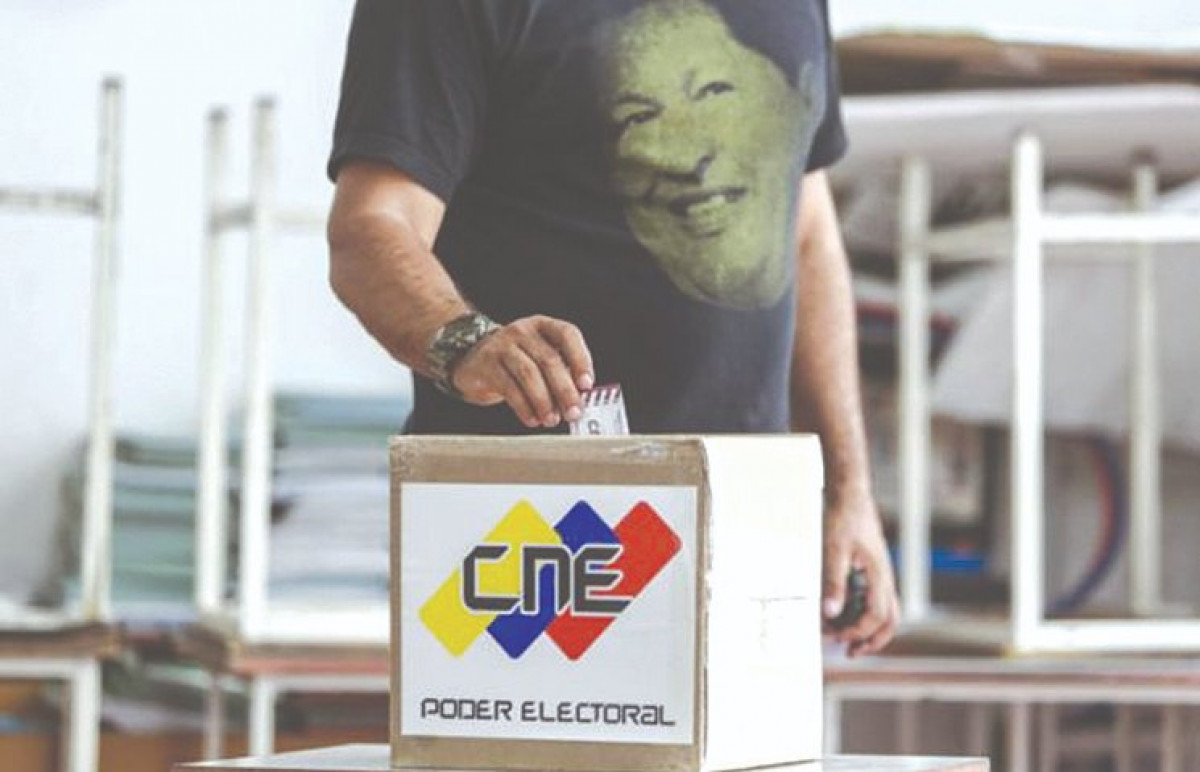
The Chavista legacy will also be present at the polls. Author: Héctor Planes/Latin American Summary Published: 19/05/2018 | 08:34 pm
NOT in vain Nicolás Maduro, a candidate of the Bolivarian forces who seeks re-election, has said that the main task of another term will be in the economy.
This Sunday’s elections in Venezuela are taking place under a foreign siege rarely seen, largely responsible for the narrow economic and financial situation, while the lack of supplies, rising prices and emigration are being manipulated to blame the Bolivarian executive for a crisis that it has not created, but that other war.
In addition to the U.S. sanctions, which have been preventing transactions with the main Venezuelan company – PDVSA – since August. There has been pressure from a European Union that is questioning the presidential elections along with more than a dozen Latin American nations, which are also following a political strategy forged in Washington: to ignore and illegitimize the elections, the only way which the Bolivarians can peacefully defeat the conspiracy against their political, economic and social system.
And the age-old U.S. gamble to justify armed aggression has been defeated, so far. Thus, the falcons also have their sights set on the elections.
At the international level, their appetites found a fence in the countries of the Caribbean and the members of ALBA which, within the framework of the OAS, have prevented the completion of the interventionist stratagem based on the allegation of a “lack of democracy” in Venezuela.
That speech was later accompanied by questioning of the calling of these presidential elections, under the argument – equally invalid and interfering – that they were premature. After using the issue to attack Latin American and Caribbean unity with the formation of the anti-Venezuelan Lima Group, ago the OAS three weeks ago still called for an extraordinary meeting of its executive council to implement new measures of punishment against Caracas.
Of course, such a position used as a breeding ground the most twisted right-wing opposition within the Mesa de la Unidad Democrática (MUD). Their leader, Julio Borges, served the diners a snack on a plate with the frustration of the dialogue he had with the government in the Dominican Republic at a time when, as he said, the agreements were ready.
It could not be surprising that these U.S. acolyte parties, after the lists of candidates for the presidency came out, were absent. It was the only way they had of calling the electoral tournament illegitimate. Now they now accuse it of being fraudulent, since three opposition candidates (Henry Falcón, from Avanzada Progresista-AP, Movimiento al Socialismo-MAS and the Partido Socialcristiano-Copei; Reinaldo Quijada, from Unidad Política Popular 89-UPP89; and Javier Bertucci, independent) inflicted a defeat on them when they registered [to participate] in the electoral battle against Maduro.
But their reluctance to nominate candidates could also have another cause: the division of positions in the face of some elections that some of the MUD parties rejected and others wanted to embrace, which is why they could not be able to run with a single candidate either.
Meanwhile, the imperial desire for intervention encountered decisive obstacles, from Venezuela’s borders inwards. These included in the lucidity and courage of the more than eight million citizens who, in July 2017, came to vote for the Constituent Assembly and in whom, later, they gave a large majority to the candidates of “Chavismo” during the gubernatorial elections, and in that of mayors.
They stopped the Manichean discourse of imperialism and those who join it, about the alleged political isolation of Nicolas Maduro within the country. What “dictatorship” was that?
It is that same long light that must be present today to that part of the electorate that wants peace and stability, but also a better life for Venezuela.
To understand it in the midst of so much media harassment and daily narrowness will be as compelling a test of consciousness as the vote for the Constituent Assembly was.
If it then threatened a violence that the Bolivarians had the courage to stoically endure, so as not to create chaos and offer a stepping stone to intervention, the scenario today, amidst economic scarcity and the financial crisis, is equally overwhelming.
Community social programs such as the Local Councils for Supply and Production (Clap) have been the government’s alternative for alleviating the lack or increase in the price of basic food products, at the mercy of right-wing entrepreneurs.
Meanwhile, in the external area, Caracas was seeking respite with a new currency: the Petro, whose digital character allows it to carry out the necessary transactions and circumvent the banks supervised by the powerful OFAC (U.S. Office of Foreign Assets Control).
However, this has not been enough to stop an aggression that will only be satisfied with the overthrow of the Bolivarian Revolution. Until 15 days ago, US Vice President Mike Pence called on the countries of the region to “sanction” Nicolas Maduro.
Hence the necessary role of the masses, and the importance of these elections. No “dictation” of foreign powers can have more force and more weight than the vote of the people. Don’t those who attack claim to defend democracy?
However, the political elites of the hemispheric right and the State Department will try to disregard any outome that may be the result of the Bolivarian victory.
It will be necessary to see how the nations captured by the White House in its campaign react if the vote in favor of Maduro and the Revolution were as profuse as the polls showed.
Attendance at the polls will also be crucial to certify the popular support of these elections. The last call of the most reactionary in the divided and almost non-existent MUD has been to abstain, while the Bolivarian forces said they aspired, in principle, for ten million votes; a figure, in fact, high, taking into account that the historical level of the Bolivarian forces in elections is just over eight million votes.
Of course, the electoral roll has increased since Bolivarian leader Hugo Chávez obtained 8.1 million votes in 2012 against right-wing Henrique Capriles Radonski. In those historic elections, just over 18 million Venezuelans were eligible to vote. Today, more than 20 million people are registered. Only they can attest to their democracy.
Against all odds, the presidential elections are being held this Sunday to assert national sovereignty and, like so many other times in that country, morer than its future will be decided.
Ultimately, achieving the defeat of the Bolivarian Revolution is the “turning point” that right-wing hemispheric forces are seeking to achieve. They aim to ensure, as in the “golden times” of Francis Fukuyama, that the end of history has come and that in Latin America the “backwards march” has taken place… Even if once again it is the wrong prediction.
This election
More than 200 personalities from institutions and different countries around the world are part of the Accompanying Mission that will testify to this Sunday’s elections.
Today, the members of the legislative councils of the various states and municipalities are also elected and nominated by various political organizations at the national and territorial levels.
This is the 24th election in Venezuela in the last 18 years.
Addicted to Violence

The United States is a Country Addicted to Violence
Twenty weeks in 2018 and 22 shootings in schools where students appear to have been born to kill or be killed
 By Juana Carrasco Martin
By Juana Carrasco Martin
juana@juventudrebelde.cu
Posted: Saturday, May 19, 2018 | 10:49:46 AM
Translated and edited by
Walter Lippmann for CubaNews.

A 17-year-old student said to be bullied by his classmates is the assailant Author: Twitter Posted: 19/05/2018 | 10:33 am
This Friday, at least ten homes in Texas did not see their children return from school. A shootout at Santa Fe High School at 7:40 in the morning resulted in the tragic death of 10 students and one teacher, and an as yet undetermined number of wounded among its 1 400 students.
A witness told KTRK-TV in Houston, that a man pulled the fire alarm and when the students left their classrooms they were shot to death. There is one person in county custody and a second “person of interest” was also arrested, Houston County Sheriff Ed Gonzalez confirmed. Authorities also said that explosive devices were later found in and near the school.
Fear once again grips American schools and that society when, on average, there has been a weekly gunfight so far this year on a school stage.
A student who identified herself as Paige to the Houston television station, in addition to saying, “I was very, very scared,” said she was not surprised by the facts: “It’s been happening everywhere. I always felt it would finally happen here, too.
That is a terrible reality, confirmed by the facts. CNN reported that this is the third shooting in Santa Fe in the last eight days and 22 in the past 20 weeks of 2018. On Wednesday, at Dixon High School in Illinois, a former Dixon High School student opened fire near where graduation was taking place; and on May 11, a 14-year-old boy in Palmdale, California, began firing a semiautomatic rifle shortly before school began at Highland High and injured a person.
“We mourn the terrible loss of life and send our support to all those affected by this absolutely horrible attack,” said Donald Trump, who was at the annual meeting of the National Rifle Association in Dallas, Texas, on May 4, and gave the NRA the first speech by an American president since 1983 – following the example of Ronald Reagan, a cowboy of arms from Hollywood movies, who also became president.
The president, who received a contribution of $31 million from the powerful arms lobby for his election campaign, told them, “You supported me, and I’m going to support you now,” they have a “true friend in the White House,” and added, “I can proudly say to the NRA that I will never again disappoint it,” while describing them as “the true American patriots of the NRA who defend our rights, our freedom, and our great American flag.
The empire’s administrator defended the personal carrying of arms, insisted on his proposal to arm “highly trained teachers” to prevent further shootings in schools, and emphasized: “The Second Amendment will never be under siege while I am president.
A press report on that NRA meeting stated: “Paradoxically, weapons were banned from the convention site, under orders from the Secret Service, the elite police force charged with protecting the high authorities in the United States.
Trump has ignored student-led mass protests across the country to force tighter gun control following the tragic February 14 shooting in Parkland, Florida, in which a 19-year-old boy massacred 17 students and adults at Marjory Stoneman Douglas High School.
Now, another boy, identified as Dimitrios Pagourtzis, a 17-year-old student who is said to have been bullied by his classmates, is the assailant, and the media report that screenshots of his social networking accounts show pictures of weapons, photos with Nazi symbols and a t-shirt with the slogan “Born to Kill”, which – according to several students at the local CW39 television station in Houston – he was wearing at the time of the incident. The weapons used were his father’s and perfectly legal….
Nothing will stop this tragic nonsense as long as the interests of the arms industry prevail and the United States is an armed society, licensed to kill in its own backyard, formed by the absurd example that comes to it from a State that organizes, foments and executes wars against other peoples anywhere in the world, because it considers itself the police and executioner-avenger of the planet.
Tillerson Out, Pompeo In

Tillerson’s gone and Pompeo’s here
Posted: Monday 14 May 2018 | 07:55:29 PM
 By Lázaro Fariñas
By Lázaro Fariñas
digital@juventudrebelde.cu
A CubaNews translation.
Edited by Walter Lippmann.
It seems that not only by going to Seville you lose your seat. For example, former Secretary of State Rex Tillerson did not go to that city, but he did go to Africa, and he lost his seat. The man, in the best Trumpist style, was called and fired. It was so humiliating that they were not even kind enough to wait for him to recover from a bad stomach acquired in that region.
Worse still, to further publicized information no one needed to know. It is known that there had long been a series of disagreements between Tillerson and the President, and on countless occasions there was a rumour that he was going to be fired at any moment. Donald Trump never forgave the Secretary of State for publicly calling him a moron at the end of a meeting with several cabinet members. Vengeful as he is, the President waited for the most inopportune moment to humiliate him.
It must be said that this gentleman was at least called on the phone, since with FBI Director James Comey, they didn’t even have that courtesy and the man learned of his dismissal on television in the middle of a meeting with his subordinates in California.
When Tillerson returned to Washington, he was no longer Secretary of State, having already been replalce in that position by that time by CIA Director Mike Pompeo.
Who’s Mike Pompeo?
When this man was appointed by Trump to the position of Director of the Central Intelligence Agency, he was a Congressional Representative from Kansas since 2011.
For some time he was in the Armed Forces where he held the rank of captain. He studied at the Military Academy in West Point, where he graduated as an engineer, and then was admitted to Harvard Law School, graduating as a lawyer, a career he practiced for a while and then went into business, until he came into politics in 2010.
Pompeo, whose paternal grandfather was born in Italy, was a member of the Congress of the Italian-American Delegation. He belongs to the ultraconservative group known as the Tea Party, a group that is on the far-right of the Republican Party.
This gentleman’s credentials as an ultraconservative are impeccable.
He supports the killings being committed by the Israelis against Palestinians in Gaza and the West Bank. He supports the method of torture by drowning [euphemistically called “waterboarding]/ He is against the closure of the torture center at the Guantánamo Naval Base. He was against the agreements that were signed with Iran. He opposes women’s right to abortion and he says that life begins at conception. He does not accept same-sex marriage. He iss a distinguished member of the National Rifle Association. He opposes the health care law that benefits the poor known as Obamacare. He does not believe in climate change, and opposes the United States signing the greenhouse gases treaty. I really don’t even know how you can be so reactionary.
At his Senate confirmation hearing, Pompeo moderated some of his positions. Of course, I knew he would not be confirmed if he held such an uncompromising position.
It is very difficult to know how this new Secretary of State will act.
It will be necessary to see if he can maintain a good diplomatic relationship with the rest of the world and if he can even stay in office having a boss as unbalanced as the one he has, a boss who likes to humiliate those under him; also, a boss who constantly contradicts himself and who constantly criticizes, lies and names his own employees.
Pompeo has a lot going against him. He declared a few days ago that he is in favor of Israel and of the crimes that that nation is committing against the Palestinians, in his favor he has the fact that he has tried by all means to avoid a war against the Democratic Republic of Korea.
He recently visited that country and met with its President. Now we’ll see if he can get Trump to heed his advice so that he doesn’t screw up with unheard of blunders when it comes time for him to sit down with the North Korean President. It is known that the White House narcissist does not like to take advice. Let’s hope he does listen to them at that next meeting, because if he doesn’t, everything that has been put forward so far to avoid war would go down the worst of roads.
Declaration of the Revolutionary Government

Cuba condemns new Israeli aggression against the Palestinian people
The Revolutionary Government of the Republic of Cuba expresses its strongest condemnation of the criminal repression by the Israeli army on the defenceless Palestinian population in the Gaza Strip
Published: Tuesday 15 May 2018 | 01:07:29 PM
A CubaNews translation. Edited by Walter Lippmann.

The image of this little girl killed by the attacks on the Gaza Strip goes around the world. Author: AFP Published: 15/05/2018 | 01:15 pm
Cuba condemns new Israeli aggression against the Palestinian people
The Revolutionary Government of the Republic of Cuba expresses its strongest condemnation of the criminal repression by the Israeli army of the defenceless Palestinian population in the Gaza Strip, which has killed at least 52 people and injured more than 2,400. This is yet another serious and flagrant violation of the UN Charter and international humanitarian law and a further outrage against the Palestinian people.
Cuba reiterates its rejection of the unilateral action of the Government of the United States to establish its diplomatic representation in the city of Jerusalem, in open disrespect of international law and United Nations resolutions, which further aggravates tensions in the region.
The Revolutionary Government reiterates once again its unreserved support for a comprehensive, just and lasting solution to the Israeli-Palestinian conflict, based on the creation of two states, which would allow Palestinians the right to self-determination and to an independent and sovereign state on the pre-1967 borders, with East Jerusalem as its capital.
Against Homophobia and Transphobia

11th Cuban Day Against Homophobia and Transphobia
 By Mileyda Menéndez Dávila
By Mileyda Menéndez Dávila
sentido@juventudrebelde.cu
A CubaNews translation.
Edited by Walter Lippmann.
Posted: Friday 11 May 2018 | 07:33:31 PM
Yesterday, as part of the 11th Annual The Cuban Day Against Homophobia and Transphobia was held at the Karl Marx Theatre in the capital, the artistic gala that every May supports respect for free and responsible sexual orientation and gender identity, as an exercise in justice and social equity. The Cuban conga against homophobia and transphobia will be held on Saturday for the same purpose.
The initiative, for the first time, will take place at 6:30 p.m., from the intersection of the capital’s streets Línea and Paseo to the José Antonio Echeverría Recreational Center. In this place will be held the Festival for Diversity at the end of the conga.
Lesbians and Assisted Reproduction in Cuba

Human Freedom Doesn’t Come Through the Gutter
When will lesbians be able to access assisted reproduction or exercise motherhood without their erotic orientation generating conflicts with the father of the child? Can they share maternity leave?
 By Mileyda Menéndez Dávila
By Mileyda Menéndez Dávila
sentido@juventudrebelde.cu
and
 Susana Gómes Bugallo
Susana Gómes Bugallodigital@juventudrebelde.cu
A CubaNews translation. Edited by Walter Lippmann.

In unconventional couples there is room for children based on love, responsibility and respect Author: Juventud Rebelde Published: 05/11/2018 | 06:58 pm
The pursuit of human freedom can never be complete without freedom for women, Betty Ford.
“I have two wonderful mothers.” That’s how the poster that a girl carried around La Rampa in Havana during the Cuban Day Against Homophobia in 2013 reads. The controversy reached the social networks and since then hundreds of questions have been raised… and very few answers given.
When will lesbians be able to access assisted reproduction or exercise motherhood without their erotic orientation generating conflicts with the father of the child? Can they share maternity leave? Why is it still believed that daughters will “imitate” them, when the overwhelming majority of homosexual people come from heterosexual, machista and homophobic homes?
According to Dr. Rosa Campoalegre, the vision of the family as an institution continues to be very traditionalist, although it no longer corresponds to a diverse reality in [Cuba’s] structures and ways of functioning, and this slows down the design of more comprehensive and unbiased public policies.
This expert from the Center for Psychological and Sociological Investigations knows that many women find themselves in the dilemma of hiding their status in order not to lose family harmony or to assume it as a life project and face discredit in the social and family sphere.
There is especially little understanding by the male ex-partner. Reactions can range from denying parental rights and duties to demanding full custody and guardianship, arguing that the new “environment” is harmful.
“This is an injustice that is not compatible with our revolutionary project and its goal of eliminating inequality gaps,” insists Dr. Mariela Castro, director of the Sex Education Center (Cenesex). “Ignorance and prejudice should not be used to justify actions of discrimination,” he said.
The law or life
Most of these women do not demand legal protection from acts harmful to their dignity or the rights of their children because they are ashamed or do not know how to do so. For example, if the biological mother is absent from the country or dies, it must be clear who assumes custody of the child, and in the event of a breakdown of the relationship, how to protect property rights.
Beyond macho atavism [backwardness], there are serious concerns about legal coverage for the diverse family configurations that [today] proliferate in the country. Manuel Vázquez Seijido, founder of Cenesex’s Legal Advice Services and deputy director of the center, says there are proposals to update the laws with a less discriminatory approach, looking after the interests of minors in particular.
Responsibility and respect
One of the biggest problems lies in the effect that living with an unconventional partner can have on psychological development. In this regard, Dr. Mariela Castro emphasizes: “Being a mother or father is not a gift of nature, you have to learn to be one in every society. Same-sex couples have shown that they can do well and seek help to take on that responsibility, just as heterosexual couples seek guidance because they are afraid of failing.
This is how the psychologist Roxanne Castellanos saw it in her consultation at the Alfonso Bernal del Riego Center for Attention to Psychological Attention: “These unions can be as functional as a typical nuclear family. The emotional consequences that impact self-esteem occur when the little person becomes aware of how different his or her life is and worries about being the target of criticism.
“The antidote,” insists Mariela Castro, “is to cultivate communication within the family and to demand that in other socializing spaces, such as the schools, the extended family or the neighborhood, they help the child to grow without humiliation or violence, and without depriving the child of her or his rights and opportunities.
It is absurd to believe that the child will end up adopting his or her mothers’ erotic model. Behaviors are learned by imitation, but not so much guidance as everyday behavior. An adequate example of love and mutual respect helps to build a healthy psychosexual identity, centeredd on the responsible enjoyment of the body and the exercise of sexual rights, rather than on the orientation of desire.
If the child is male, male role models can be provided outside the home, just as when the father figure is missing due to widowhood, abandonment or divorce. In addition, sexual orientation is a process that does not finish maturing until late adolescence or youth and by then there are other patterns when it comes to shaping the erotic taste: friendships, teachers, artists, sportsmen…
If the home is functioning well, there is no need for external psychological support, because it will be a space of contention and development where they will always find love, trust and material support, agree the interviewees.
Grandparents’ Tales
 Grandparents’ Tales
Grandparents’ Tales

By Lázaro Fariñas
Posted: Monday 07 May 2018 | 07:06:53 PM
A CubaNews translation.
Edited by Walter Lippmann.
I don’t think it’s elegant or attractive to make up personal stories. I think that everyone’s life is their own and private, and if it is ever told, it should be told by others. I don’t know, then, why I’m writing this commentary. Am I getting old? Is it nostalgia for another time? Or do I feel very satisfied with what I did during one stage of my life and I want to talk about it?
At the end of the 1980s, I wrote articles for various publications in Latin America. The Prensa Libre of Costa Rica and the Nuevo Diario of the Dominican Republic were my favorites, and I sent my weekly comments to those media outlets. I never suffered any censorship. It was published just as I sent it, not one comma would be changed. It was not easy to write from abroad to be read in other countries, considering that it was for different idiosyncrasies, ways of thinking and points of view that I sent my opinions. I have to confess, without fear of being pedantic, that I was very well-received by those readers who had few interests in common with me.
Already in 1989, and due to the beginning of the collapse of the socialist camp in Europe, the media in Miami began to open up to me. I began writing articles frequently in El Nuevo Herald of Miami, and was a frequent guest on local television and radio talk shows.
Since the troglodytes of the anti-Cuban right in this city were sure that the fall of the revolutionary government of Cuba was imminent, they dared to give a voice to people who thought differently. At that time, I became an integral part of a daily television program called Debate, where I shared space with two journalists who thought differently from me and always, in addition, with the participation of guests from the far right, who wanted to measure strength with me. Once again, without wanting to be pedantic again, they would come for wool and come out shorn.
In that program, I debated with the cream of the Miami right: heads of counterrevolutionary organizations, “vertical fighters” and coffee and milk leaders were my different opponents. Of course, the two journalists who accompanied me on the show were also my opponents.
When the USSR collapsed, I stopped participating in the program. The real reason was because I got tired of having to wear a necktie every day to go argue with idiots.
Although I was invited regularly to different spaces like this throughout that decade and half of the next, the atmosphere was no longer pleasant. I was increasingly tense and hostile, the more the threats, the more violent the attacks, not only from the directors of those programs but also from the public to whom they opened the phone lines to insult me. Actually, I had enough intelligence, cunning and patience to get around the insults, which, as the saying goes, came in one ear and came out the other; that is, they slipped out the other, for, as is commonly said, to foolish words, deaf ears.
But to continue participating in those media brought with it an enormous sacrifice. In order to defend myself correctly from those verbal attacks, I had to pay attention to what they said on the other programs. I had to hear them every day. I didn’t care about personal offenses, but having to tune in to them was a different matter. The time came when it was like self-flagellating or digesting vomit just for the sake of vomiting.
I remember that when the leader of the Cuban Revolution, Fidel Castro, resigned as President of the Council of State due to health problems, I sent a note to Cubadebate wishing the Commander a speedy recovery. A few days later I was invited to a TV show and they read the note I had sent as if I were being caught in the crowd. I remember telling the director of that program and the journalist who was with her that she not only wanted Fidel to recover from his illness, but also wanted him to return to his post soon.
I have always said, written and done what I believed, I have always been consistent with what I thought.
I was a teenager during Batista’s time, not ten years old when Fulgencio entered Camp Columbia with his gorillas. I did everything I could against him. When after, 1959 I disagreed with some revolutionary measures, I opposed them and left Cuba.
When my homeland was left alone due to the disappearance of the Soviet Union, I began to travel to the island regularly and had the opportunity to meet three or four times with Fidel, a man I always respected and of whom I always publicly affirmed in Miami that he was the island’s best and most faithful defender.
JR: Send Us Your Best May Day Selfie

Send Us Your Best May Day Selfie
Send us your best photo during the May Day activities
 By Leyanis Infante Curbelo
By Leyanis Infante Curbelo
leyanis@juventudrebelde.cu
 Maykel Espinosa Rodríguez
Maykel Espinosa Rodríguez
English Article Here
Translated and edited by Walter Lippmann for CubaNews.

Send us your best selfie during the May Day activities Author: José Raúl Concepción Published: 04/28/28/2018 | 09:51 pm
Next Tuesday will be a day of great movement throughout Cuba. It is May Day, when one of the country’s massive celebrations takes place and is joined by large sectors of the population. It’s International Workers’ Day.
Millions of workers, professionals and students will greed the sunrise, occupying their positions to participate in the traditional parade that is organized in every corner of the archipelago. It is a time to celebrate our conquests and to reaffirm our support for the continuation of the revolutionary process.
We invite you to share with us your experiences as part of this commemoration through the most personal of images: a selfie. The most original and successful will be published in the printed version of our journal.
You can send your images to our emails mirada@juventudrebelde.cu and lamiradadellector@gmail.com, or through our Facebook. Remember to attach your data, and the geographical location (country, city, municipality, neighborhood…) where the photo was taken.
So grab your camera or cell phone and meet me at the parade.
Subscribe to Blog via Email
| M | T | W | T | F | S | S |
|---|---|---|---|---|---|---|
| 1 | 2 | 3 | 4 | 5 | 6 | 7 |
| 8 | 9 | 10 | 11 | 12 | 13 | 14 |
| 15 | 16 | 17 | 18 | 19 | 20 | 21 |
| 22 | 23 | 24 | 25 | 26 | 27 | 28 |
| 29 | 30 | |||||

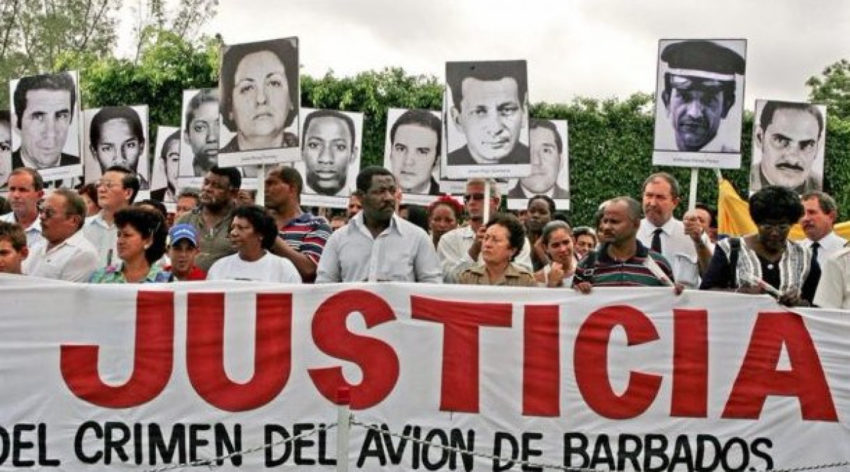

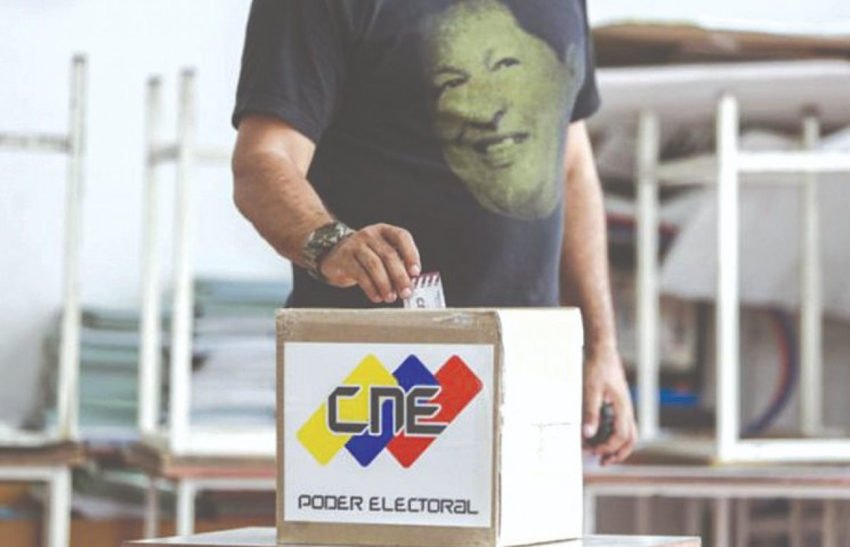




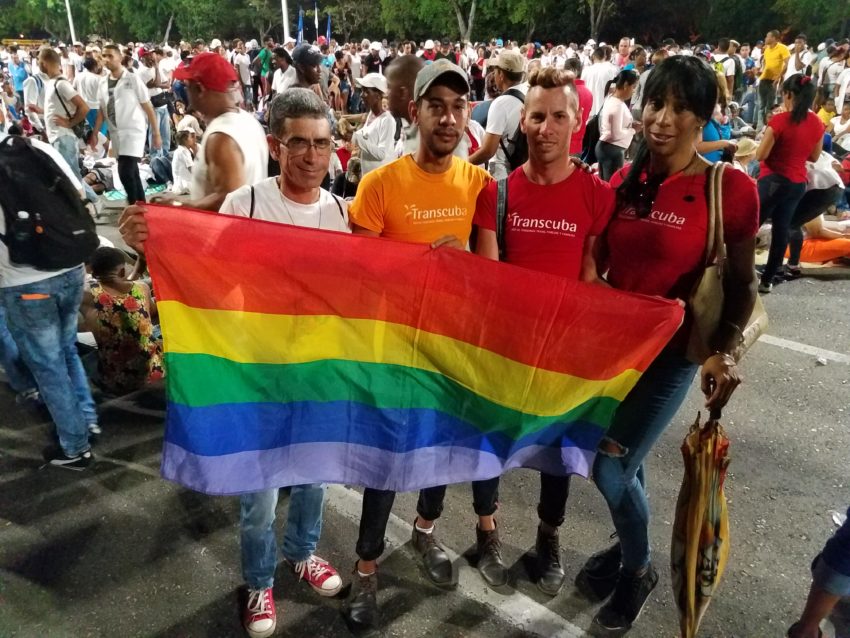


You must be logged in to post a comment.